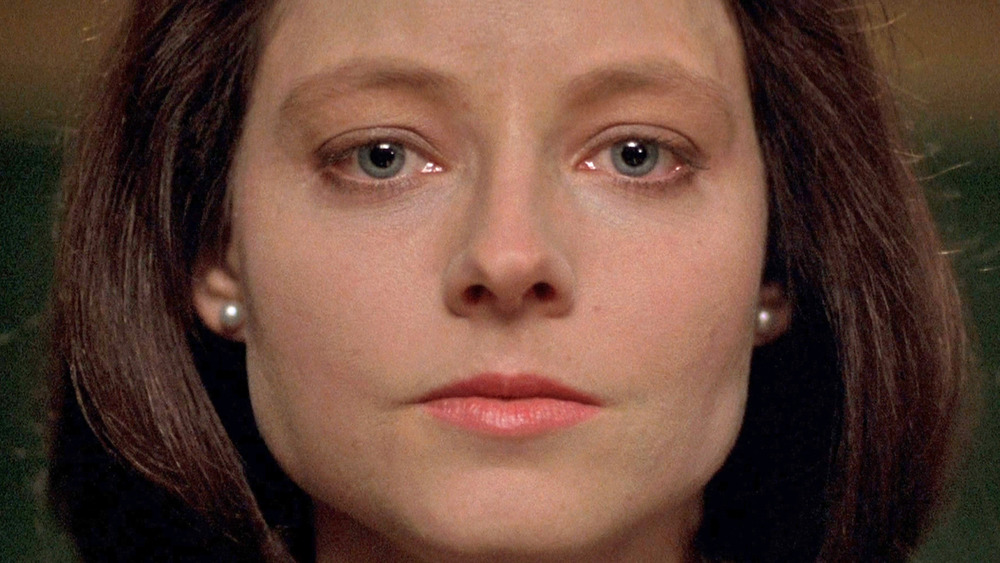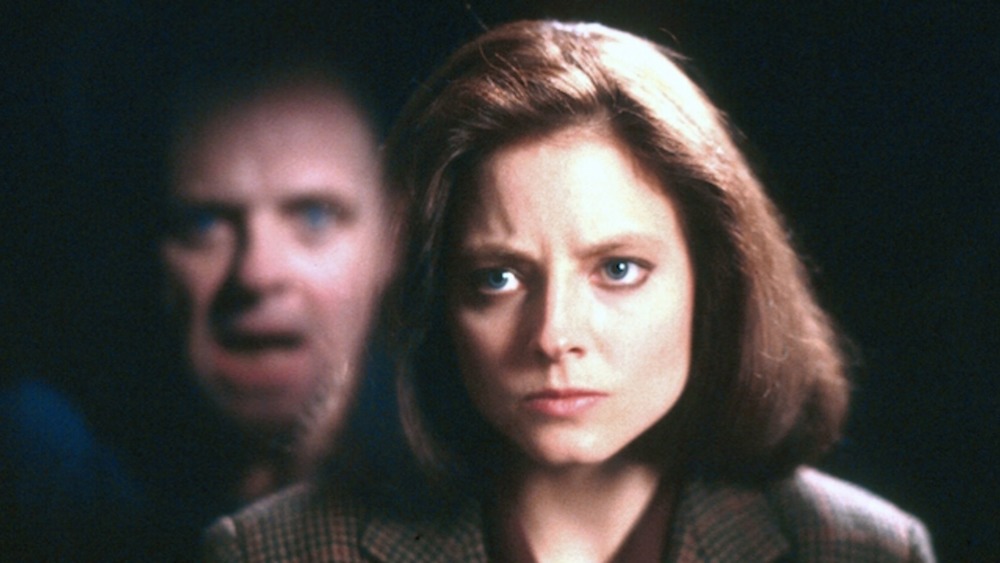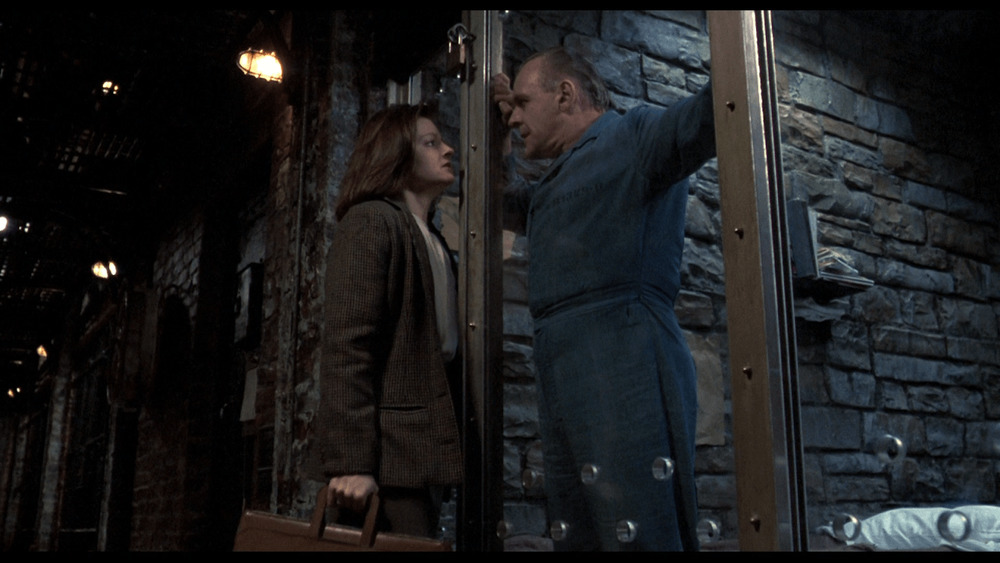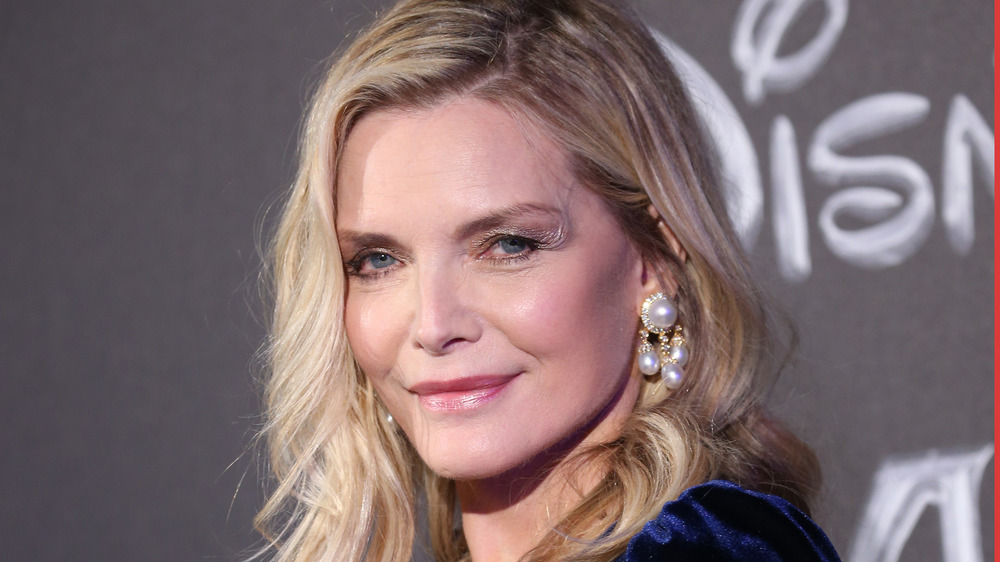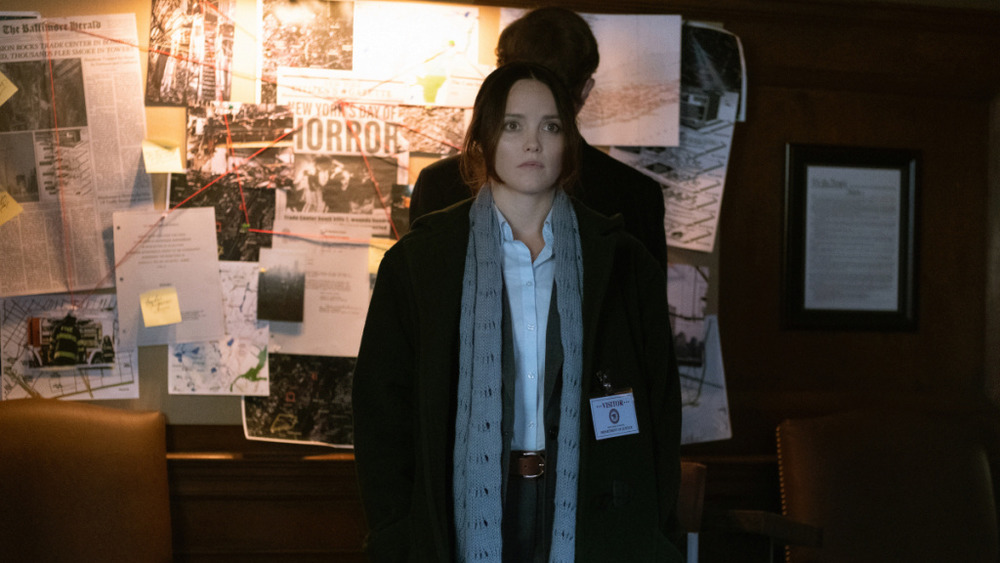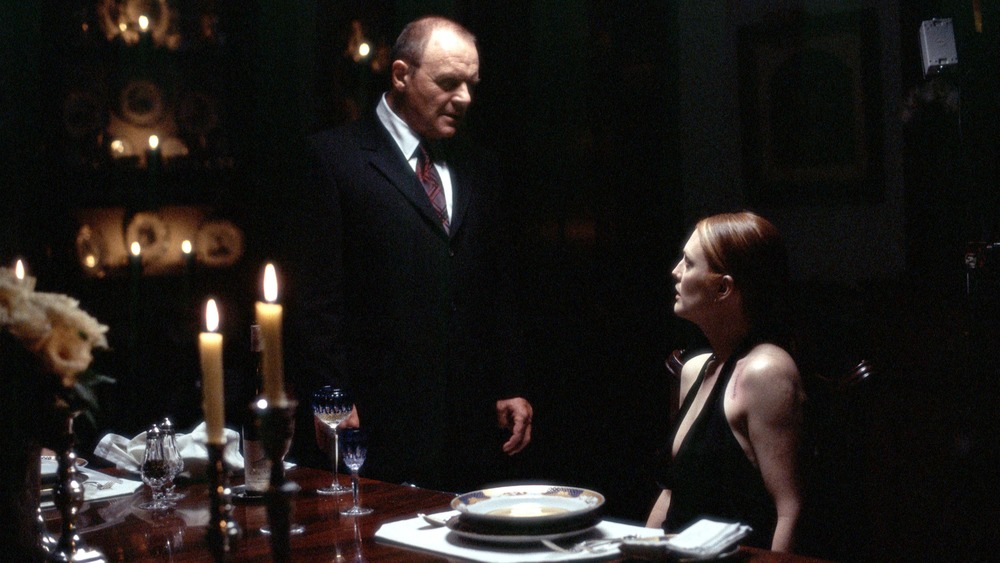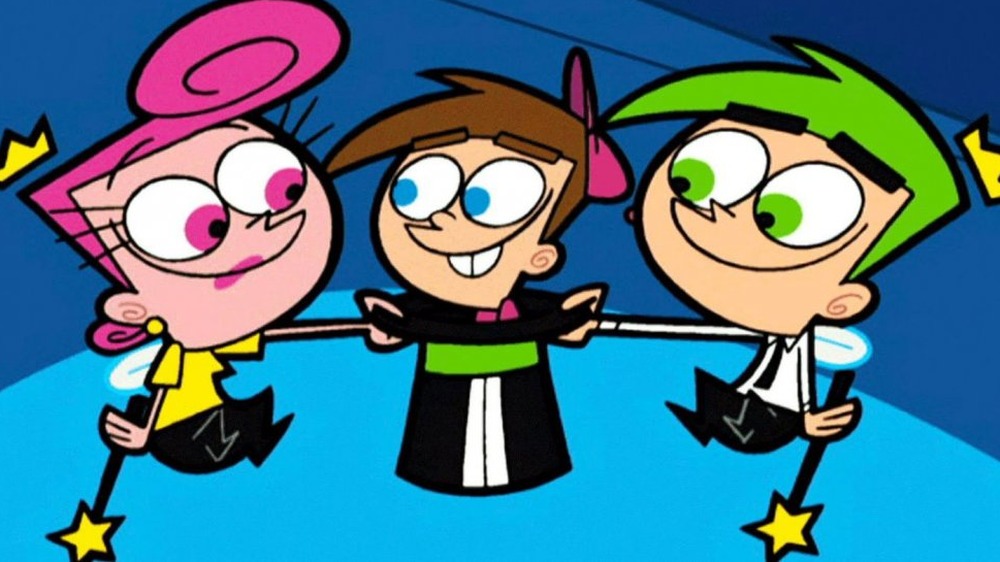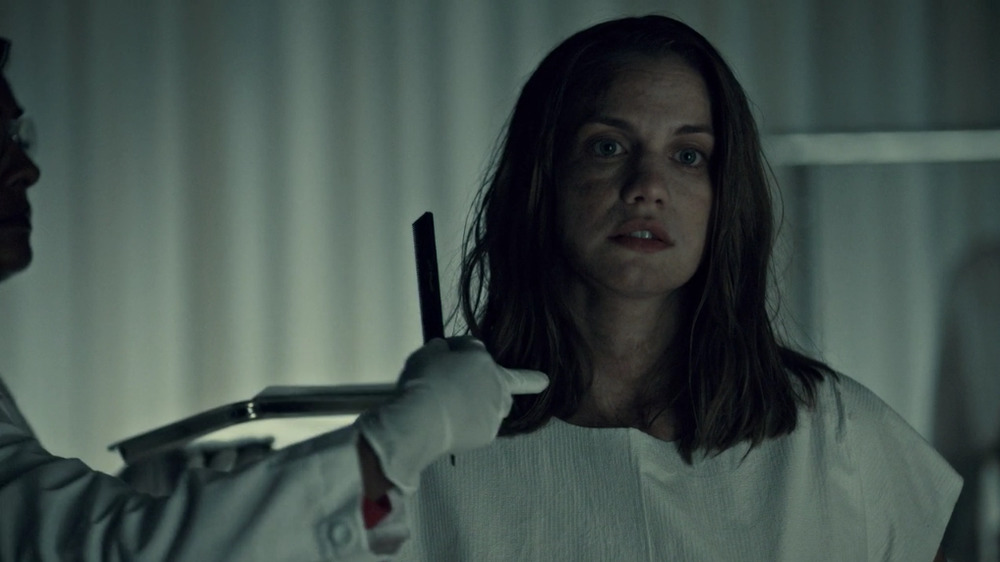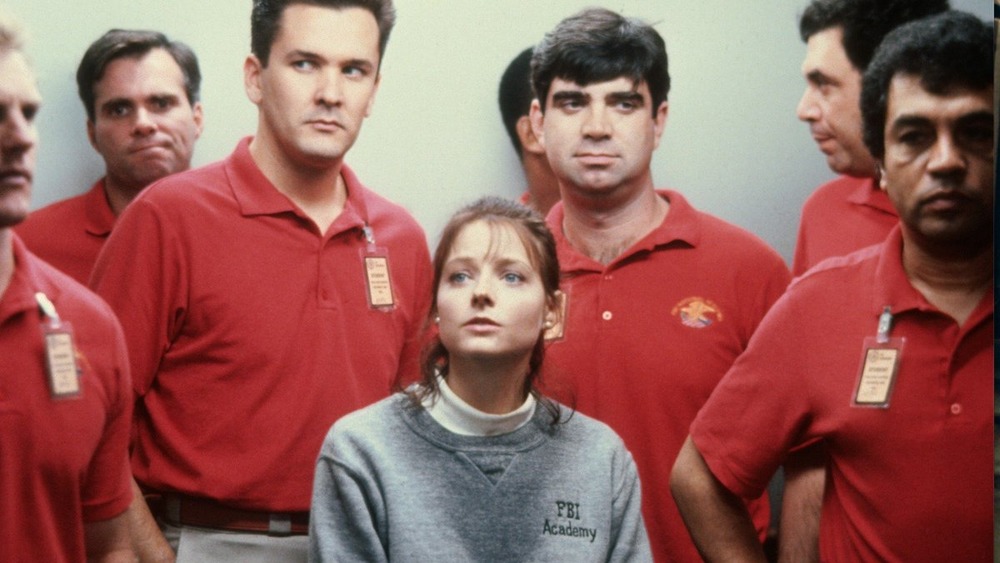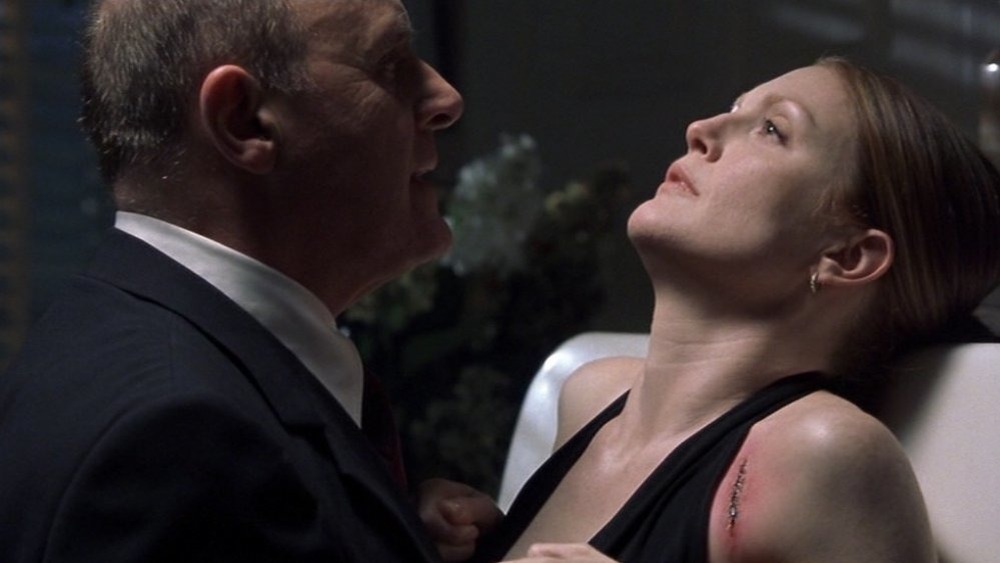The Untold Truth Of Clarice Starling
First introduced in Thomas Harris' 1988 novel The Silence of the Lambs, Clarice Starling has become an iconic character. As played by Jodie Foster in the 1991 film adaptation of the bestselling book, Clarice ushered in a new era of female characters who are tough, determined, and unabashedly occupy male-typical roles. Despite being overshadowed for years by Dr. Hannibal Lecter, the showier character in both the novels and the films, Clarice is getting her due: She finally has her own television show, aptly titled Clarice. Set one year after the events of The Silence of the Lambs, this show follows Clarice as she becomes a full-fledged FBI agent.
Though Hannibal Lecter did steal some of her thunder, Clarice made an undeniable impact on the public consciousness: Consider the fact that when former FBI agent Candice DeLong's memoir was announced, she was referred to as a "real-life Clarice Starling." The years since the film's debut have only further cemented Clarice as a feminist icon, with the BBC calling the film "miles ahead of its time."
In light of this celebration, we're here to present the untold truth of Clarice Starling, in all her various incarnations.
Clarice was inspired by a real FBI agent
Though Candice DeLong is frequently called "the real Clarice Starling," Clarice was actually based on multiple figures, including real-life FBI agent Patricia Kirby, who once worked in the FBI's Behavioral Science Unit. At the behest of her boss, Kirby met with Harris when he was doing research for The Silence of the Lambs. The insights she provided into her job show up in the novel, especially in the specifics of how Clarice interacts with Lecter. In a 2016 interview with The Portland Press Herald, Kirby stated that her own research showed that "male serial killers love visitors, they love if you're with the FBI, and they love if you're a woman". The way in which Clarice is able to get Lecter to assist in her hunt for Buffalo Bill stems from what Kirby taught Harris. While there are differences between Kirby and Clarice (Kirby's from the big city of Baltimore, not a small town in West Virginia, for one), the methodology she shared is a big part of Clarice's character.
Clarice constantly battles misogyny
Clarice has to put up with constant, corrosive misogyny and sexual harassment at seemingly every turn. She endures disgusting indignities from the prison's inmates as she walks past their cells on her way to meet with Lecter. She is forced to deal with the way the Department of Justice's Paul Krendler treats her as if she knows nothing and is worth a whole lot less than any male agent. She never gets a reprieve from the way her male coworkers and other professionals, such as Dr. Chilton, regard her as a sex object instead of a person. Clarice never, ever gets to forget she's a woman working in a man's world, no matter how well she does her job.
This is frustratingly true to life. Male-dominated work spaces in 1988 were (and often still are) notoriously hostile to women: In her memoir, Candice DeLong details the grinding gauntlet she and other female agents were forced to endure during those years. But in light of the broader cultural emphasis on Lecter's antics, it's still somehow easy to forget all that Clarice has to battle through in her career. Clarice doesn't just take down bad guys — she does it while shouldering a massive cultural burden that exists beyond the silver screen. Her struggle is entirely real, as women in male-dominated fields know well.
Jodie Foster wasn't the first choice to play Clarice
Jodie Foster brought Clarice Starling to unforgettable life — but she almost didn't play her at all. At the 2014 Austin Film Festival, director Jonathan Demme told Paul Thomas Anderson he wanted to cast Michelle Pfeiffer, Meg Ryan, and Laura Dern before Foster. Pfeiffer and Ryan declined, and the studio didn't think Dern was a big enough name. Demme wasn't impressed with what he'd seen Foster do previously, but he wound up changing his mind when he finally met with her.
Prior to this, Demme's number-one choice was Pfeiffer, with whom he'd worked on his 1988 film, Married to the Mob. So why did she turn down the role? As Pfeiffer herself stated to The New Yorker in 2021, it was due to the "evil" in it: "It was that evil won in the end, that at the end of that film evil ruled out. I was uncomfortable with that ending. I didn't want to put that out into the world."
Clarice has been played by four actresses
In The Silence of the Lambs, Jodie Foster played adult Clarice, while Maria Skorobogatov played her as a youngster. But they're not the only two actresses to step into the FBI agent's shoes.
When it came time for 2001's Hannibal to cast its Clarice, Foster opted not to return to the role she embodied so well. She was busy planning her own film, Flora Plum, which wound up plagued with issues and still has yet to come to fruition. Rumor has it, though, that neither Foster nor Demme were happy with Clarice's character arc in Hannibal. Though Foster hasn't said as much definitively, she did shade the film in a 2005 interview with Total Film by acknowledging she's seen it, but refusing to comment on it. She did, however, discuss how she and Demme didn't want to "trample" the character. Julianne Moore wound up accepting the role: She later stated that playing Clarice was such a journey into darkness that she discussed it with her therapist.
Australian actress Rebecca Breeds of Pretty Little Liars fame is the latest actress to take on the role in the 2021 series Clarice.
Clarice has a very different ending in the books
Seven years passed between the publication of Thomas Harris' 1981 novel Red Dragon and its sequel, 1988's The Silence of the Lambs. An even longer wait ensued after that: The third novel in the series, Hannibal, was published in 1999. When Hannibal was finally released, the ending was heavily criticized. Even though Lecter holds Clarice against her will, drugs her, and attempts to brainwash her, she eventually chooses to run off with him and become his lover.
In an essay reconsidering Hannibal for CrimeReads, Patrick J. Sauer argued that many fans feel Harris "sold Clarice Starling down the river." Fantasy & Science Fiction, in its review of Hannibal, called Clarice's ending "truly unpleasant." MIT's The Tech noted that Clarice "behaved inexplicably."
By the time Ridley Scott took the reins of the adaptation, he asked to change the ending because he "couldn't take that quantum leap emotionally on behalf of Starling." Scott thought there was simply too big a gap between what Clarice suffered and her decision to offer herself up sexually to Lecter.
Clarice's name shows up in weird places
America's infatuation with serial killers, coupled with Sir Anthony Hopkins' bravura performance as Lecter, has kept The Silence of the Lambs at the forefront of popular culture for over 30 years. Symbolizing this consistent popularity is the unique way Hopkins pronounces "Clarice." References to this line reading pop up in everything from The X-Files to Mystery Science Theater 3000. Even lighthearted sitcoms such as Will & Grace aren't immune to dropping a "Clarice" joke or two.
But the strangest place you can hear "Clarice" is in the zany Nickelodeon cartoon The Fairly OddParents. In "The Gland Plan," Anti-Cosmo, evil doppelganger of the good-hearted Cosmo, sneers, "Hello, Clarice," as he's kept in a cell. For a cartoon pitched at kids ages seven and up, that's pretty dark. Let's hope that particular reference sails over the heads of the cartoon's youngest viewers — there just isn't a good way to introduce Hannibal Lecter to grade-schoolers.
Hannibal features a quasi-Clarice character
Showrunner Bryan Fuller frequently discussed wanting to create his own version of Clarice for his TV series, Hannibal. There was an obstacle to this, however: He needed to secure the rights to the character from MGM. Unfortunately, the show was canceled before the rights issue was ever worked out. Anna Chlumsky's character, Miriam Lass, was as close as Fuller would get.
Miriam and Clarice do, in fact, have a lot in common. Both Miriam and Clarice are FBI profilers, and, like Clarice, Miriam comes into contact with Lecter. However, when Miriam figures out Lecter is a murderer, he holds her captive in a well, brainwashes her to believe Chilton is her captor, and severs her arm — a harm he would never visit upon Clarice.
In a 2015 interview with Mandatory, Fuller did say that if he could've brought back Chlumsky in a Silence of the Lambs-based season of Hannibal, Miriam would have continued on as a separate character from Clarice.
Clarice has been used as a real-world recruitment tool
Both The Silence of the Lambs novel and its wildly popular film adaptation put the misogyny rampant at the fictional FBI on full display. And yet, the real FBI not only cooperated with the filming of The Silence of the Lambs, they celebrated it 30 years later on their official website.
At the time of the film's debut, women made up only 10 percent of the total agents in the FBI. The agency was under scrutiny, and looking to diversify (though the process was, unsurprisingly, controversial). By assisting with a film that would show a strong woman agent overcoming adversity to catch a killer, the FBI wanted to show there was indeed a place for women in their ranks. Unfortunately, despite having increased the percentage of women in the overall FBI workforce to 44.4 percent as of 2020, the FBI still has a ways to go in achieving parity. Perhaps Clarice and nostalgia for the original Silence film adaptation will help recruitment efforts.
Clarice's empathy is a strength and a weakness
Clarice's empathy is one of her key characteristics, enabling her to better profile the killers she hunts while retaining sympathy for their victims. Empathy is what drives her to find Buffalo Bill — she doesn't fully relax until he's gone. At the end of The Silence of the Lambs, Harris says that Clarice "sleeps deeply, sweetly in the silence of the lambs." But in Hannibal, Clarice is in trouble at her job and newly susceptible to Lecter's machinations. Years of harassment and hunting the dregs of the Earth have caught up with her.
CBS' Clarice contends that Clarice isn't actually as settled at the end of Silence as she appears to be. In the first episode, Clarice is haunted by thoughts of finding Catherine in the well, and of shooting Jame Gumb. In her first test working with Paul Krendler (Michael Cudlitz), she's back to being tentative about giving her thoughts and observations on a case. It doesn't help that her new coworkers mock her with sexist remarks. Being empathetic is a good trait, but it can also lead to fatigue and burnout. This could be why she's not in the best psychological shape in the new series — in opening herself to horrors, she's become scarred by them.
There are many interpretations of Clarice's name
Anyone who's taken an English literature class has probably analyzed a character's name when discussing that character's attributes. Careful naming of a character can act as shorthand for their personality, after all — such is the case with Harris' creation.
"Clarice" means "bright," and a starling is a bird, so her name could mean "bright bird." Clarice is certainly intelligent, and thus very bright. However, starlings are also sometimes regarded as "loud and annoying," which gives Clarice's quiet nature and the introspective way her character is portrayed something of an ironic twist — especially in the context of her distress at the screaming lambs. Of course, there is also a physical comparison to be made, as starlings are small and fast. Clarice herself is short, especially compared to her fellow agents, and a runner. Personally, we're big fans of the "loud and annoying" aspect of starlings coming to bear upon Clarice's character: It teases a tension that might just come to an explosive (and well-justified) head some day.
